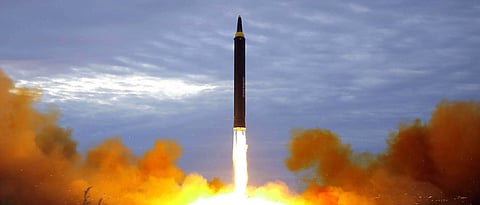

During the past seven months, supreme leader of the Democratic People’s Republic of Korea (DPRK) or North Korea (NK) Kim Jong-Un has ordered a launch of ballistic missiles and six nuclear tests, the latest one being a hydrogen bomb, keeping mainland US in mind as a target.
This has infuriated US President Donald Trump, thus pushing the entire East Asia to the brink. But will they commit hara-kiri by attacking each other, considering that both have nuclear weapons?
“It is very difficult to predict. Both leaders are idiosyncratic with somewhat unpredictable tendencies. The NK leader is known to be irrational. He is a dictator in full sense. However, the US has a democratically elected leader with its checks and balances.
The chances of US leader taking an irrational action are much less,” former Chief of Army Staff, General (Retd) Ved Prakash Malik said.
The world today does have a problem in dealing with the NK dictator on such a sensitive issue.
“It is once again facing a crisis of nuclear proliferation and nuclear weapons being controlled by an irrational and dictatorial mind. This is likely to lead to an arms race in East and South East Asia. Some nations may even attempt to develop their own nuclear deterrent by overt or covert means. We can expect further nuclear proliferation. There will also be greater efforts to develop anti-missile shields and passive nuclear safety measures,” General Malik said.
However, according to the former Army chief, there is no need for India to get involved directly. It should join its voice with other rational thinking nations strongly.
Lt Gen (Retd) D B Shekatkar, a former commander of Corps in the North East and Ex-Additional Director General Military Operations (ADGMO) and DG Perspective (Strategy Planning), said that the cause of concern here is the mode of delivering any nuclear bomb.
“Earlier, the atomic bombs over Japan were dropped from aircraft. The H-bomb tested by NK is fitted on missile systems making it more dangerous, as it is very difficult to control a missile once it is fired no matter what accuracy level is claimed. Even an accidental shooting of a missile with H-bomb warhead can cause enough havoc,” he said.
Considering the disaster caused by atomic explosions in Hiroshima and Nagasaki, US and NK going to war against each other is an unlikely possibility.
“There are alternate options to stop NK like negating the launch, trajectory control and other controlling mechanisms of missiles by hacking into its system,” he said.
The former ADGMO said that the situation has arisen because of China, which has been protecting two 'rogue nations' - Pakistan and North Korea.
The former Corps Commander said that while the onus lies with China to defuse the volatile situation in Korean Peninsula, the world must also rethink about the usefulness of China in a global forum today.
“In 15 years, it will be more powerful than the US. Its history of nuclear proliferation should be considered by UN Security Council and take away its veto power,” he said.
Major General (Retd) Shishir Mahajan, who has led an Army Division in the North East, said that North Korean missiles may or may not reach the US. But that is not the cause of worry for India.
“It is a known fact that China discreetly helped Pakistan to build its nuclear arsenal and the latter sold the nuclear bomb technology illegally to NK. There is every possibility for the reverse to happen where NK’s hydrogen bomb technology is passed on to Pakistan. Things will go worse if this technology lands up with jihadi elements operating in Pakistan,” Maj Gen Mahajan said.
According to Maj Gen Mahajan, if this happens, then even China will be unsafe as it is fighting protracted Islamic insurgency in its far west province of Xinjiang.
“It is in China’s interest to intervene and cool off the situation,” he said.
The former director at Ministry of Defence, Group Captain (Retd) T P Srivastava said, pre-emptive strike by the USA on NK's nuke facilities is unlikely to succeed in totality since the latter has made a development of nuclear weapons and launch vehicles a national aspiration.
“It will not hesitate to deliver a nuke if pushed against the wall as has been amply demonstrated by the launch of an Inter Continental Ballistic Missile. Regimes can be overturned. But Kim Jong-Un’s removal from the scene may result in greater chaos. Associated with this is the risk of nuclear ‘button’ falling into the wrong hands,” he said.
As of now, DPRK regime listens to China only. But in the fast changing international scenario, Indian intervention to diffuse the crisis cannot be ruled out.
“We have returned virtually from the brink after the Doklam standoff. Here is an opportunity for India to volunteer and seize the initiative to diffuse the situation by sending a senior minister like General (Retd) V K Singh to meet Kim Jong-Un. This will ensure Korean missiles of larger range don’t find their way into Pakistan arsenal,” he added.
Timeline of North Korea nuclear tests
· Sept 3, 2017: North Korea said it set off a hydrogen bomb in its sixth nuclear test
· Sept 9, 2016: North Korea said it conducted a 'higher level' nuclear warhead test explosion
· Jan 6, 2016: North Korea claimed it had tested a 'miniaturised' hydrogen bomb
· Feb 12, 2013: Detonated a miniaturised nuclear device at a northeastern test site
· May 25, 2009: North Korea carried out a powerful underground nuclear test, much larger than one conducted in 2006.
· Oct. 9, 2006: The North announced its first nuclear test -- in North Hamgyong Province
